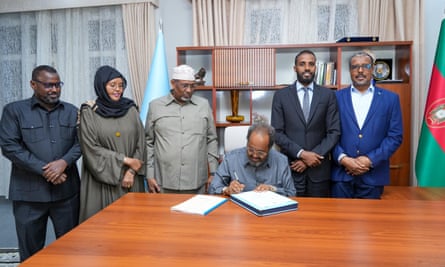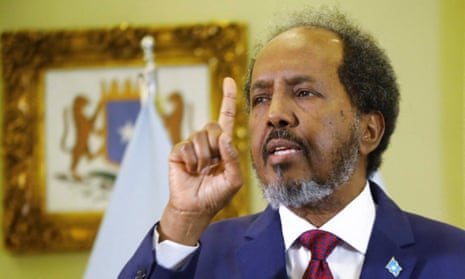A new constitution for Somalia, bringing in universal suffrage and dismantling the clan voting system, has been refused recognition by the most stable and wealthiest of the country’s states.
The semi-autonomous state of Puntland says it has withdrawn from the country’s federal system until constitutional amendments passed by parliament in Somalia are approved in a nationwide referendum.
The information minister from the Puntland claimed the amendments risked more violence in Somalia, a country wrestling with insecurity from the al-Qaida-linked al-Shabaab group. Mohamud Aidid Dirir told the Guardian that “almost a totally new constitution” had been introduced without input from the Puntland’s leaders. He accused the Somali president, Hassan Sheikh Mohamud, of using parliament to “gather authority into his hands”.
One of the main changes which will come into play in time for local elections in June 2024, is the introduction of voting rights for all, ending the clan-based indirect voting system that has historically been in place in Somalia.
“The basic principles should be that the election of the Federal Somali Republic must be one that gives the public the opportunity to cast their votes democratically in a one-person, one-vote system,” the government said in a statement after reaching an agreement last weekend.
The reform aims to “encourage the multiparty political system” that is independent and “corruption free”, it added.
Somali lawmakers voted overwhelmingly to adopt the slew of amendments to the constitution, which will reshape the political and electoral system.. The parliamentary speaker, Adan Mohamed Nuur Madobe, called the move “historic”.
Critics say the changes, to include introducing direct presidential elections and giving the president power to appoint and dismiss a prime minister without parliamentary approval, concentrate too much power in the hands of the executive.
Puntland, one of Somalia’s five federal states, declared itself a separate self-governing entity in 1998, and is the country’s most powerful regional administration.
“We are a fragile country still recovering from a civil war, which doesn’t have stable politics. If power is concentrated in one person’s hands, there is a risk we could go back to civil war. We have always warned that this could happen,” said Dirir.
“[Hassan] has taken power from parliament, the prime minister isn’t working. He is the foreign minister, the prime minister, the president, he is all the ministers. And now he’s taking power from the states.”
Dirir claimed Puntland was stonewalled by central government when it tried to participate in consultations. He said the region would not recognise the changes.
“We are not declaring independence, but Puntland will stand alone until it is consulted.”
It comes amid tensions with Mogadishu over the state’s relationship with Ethiopia, a landlocked country which has been courting neighbouring Somaliland and Puntland over coastal port access. The Somali government on Thursday ordered the closure of Ethiopia’s consulate in Puntland in retaliation for a visit by representatives to Addis Ababa this week. The government also expelled the Ethiopian ambassador, citing interference in Somalia’s internal affairs.

Dirir said concentrating authority in Mogadishu “threatens national unity”. “Our government is federal, which means powers are divided,” he said.
Afyare A Elmi, a research professor at the City University of Mogadishu, said Puntland’s withdrawal from the federal system could imperil the viability of a unified nation.
“If a large chunk of the country is missing in this process we are simply building a constitution for south-central Somalia.”
Other federal states, Jubbaland, South West state, Hirshabelle and Galmudug have not criticised the amendments. Somaliland, which declared independence from Somalia in 1991, said: “Somalia’s recent constitutional development is an internal matter.”
Former presidents Mohamed Abdullahi Farmaajo and Sharif Ahmed warned the changes could upset Somalia’s delicate power balance, while former prime ministers Omar Sharmarke and Hassan Ali Khaire denounced the changes in an open letter also signed by the veteran MP Abdirahman Abdishakur.
Somalia’s current constitution was introduced in 2012 as a provisional document and has long been under review. Crafting a new constitution was one of President Mohamud’s key election pledges in 2022. Last month he said further delays were “not an option”. “We are not a provisional government, but we have a provisional constitution,” he added.
Afyare Elmi said the 2012 constitution was based upon a political settlement with broad input from Somalis. “It had four key elements: federalism, clan power-sharing, regular elections and a spirit of inclusiveness to build consensus. What the government is doing now is moving away from this settlement,” he said.
Omar Mahmoud, an east Africa analyst at the International Crisis Group, wrote that “there are fundamental issues about the nature of the federal model that must be sorted out between Mogadishu and Garowe [Puntland’s capital] in order for Somalia’s governance system to function more effectively and get over the hump of recurrent on-and-off relations.
“But without the sides talking, it is impossible to get there, allowing the status quo to continue indefinitely.”
